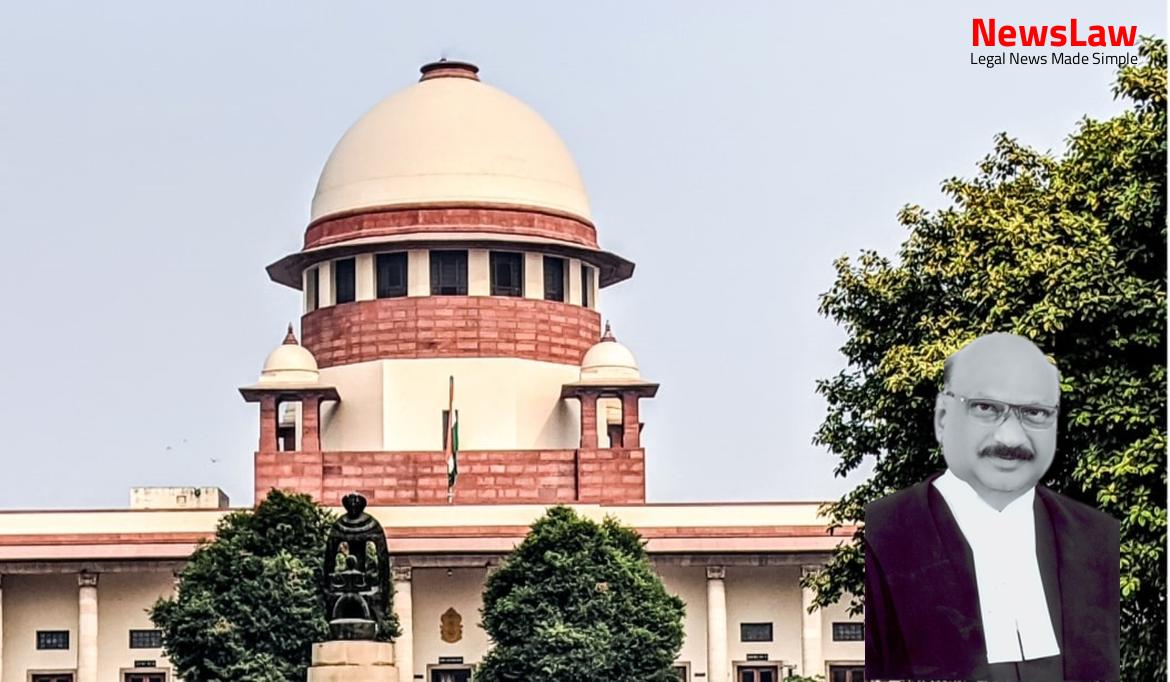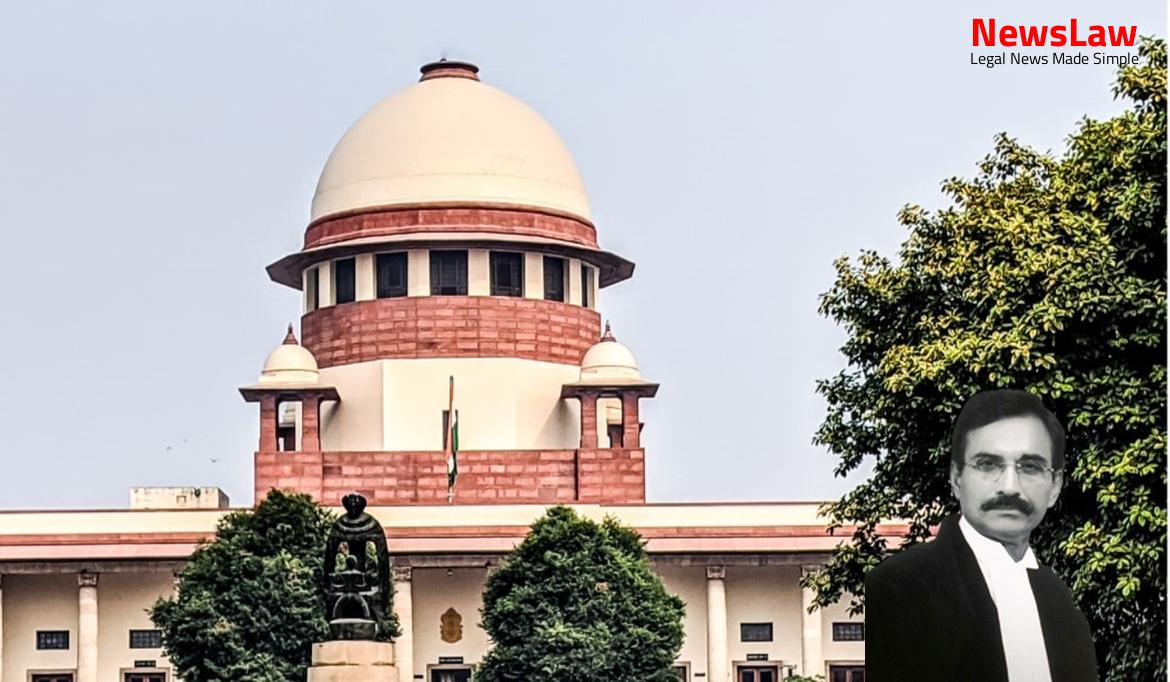In a landmark decision by the Supreme Court of India, the judgment addresses the denial of the right to Central Laboratory testing in a case involving the Retailer and Orange Tammy. The case raises crucial issues surrounding fair trial rights and procedural fairness. Stay tuned for key insights and analysis of this significant legal ruling.
Facts
- Retailer moved an application under Section 20A of the 1954 Act to implead the Appellant as an accused.
- Appellant was the marketer of ‘Orange Tammy Sugarless Jelly’ manufactured by a separate entity.
- Respondent No 2 queried for information about the Appellant’s connection to the Jelly.
- Retailer did not initially have proof of purchase from the Appellant.
- Receipt later produced showed purchase of Jelly from the Appellant.
- Appellant did not respond to queries regarding the misbranding of the Jelly.
- Samples of the Jelly were purchased by Respondent No 2 for testing purposes.
- Appellant tried to quash the order through a Section 482 application in the High Court.
- The High Court determined that mens rea was not required for the offence under Section 7 of the 1954 Act.
- Due to this finding, the High Court refused to utilize its inherent powers under Section 482 of CrPC to annul the impleadment order from 01.09.2015.
Also Read: Priority of Employees’ Dues in Asset Sale: SARFAESI Act vs. Land Revenue Code
Arguments
- The Appellant argued that Section 13(2) of the 1954 Act applies not only to ‘adulterated’ food articles but also to testing for other offenses under the Act.
- The delay in impleading the Appellant was attributed to the Respondents’ negligence in addressing communications to the wrong branch office.
- The Respondents argued that Section 13(2) only pertains to ‘adulterated’ food samples and not other offenses under the Act.
- The Appellant’s counsel contended that the application for impleadment under Section 20A was not maintainable as it can only be made by parties not classified as ‘manufacturer, distributor, or dealer’ of the food article.
- The denial of the statutory right to re-test samples by a Central testing laboratory on account of delay renders prosecution futile.
Also Read: Judgment Acquitting Accused in Satpal v. State of India
Analysis
- The Appellant’s right to apply for testing of the Jelly by the Central Laboratory under Section 13(2) was denied.
- The denial of the right was due to the fault of the Respondents.
- The denial of the right prejudiced the Appellant’s case as the Jelly sample was perishable.
- The Appellant could have requested re-testing at the Central Laboratory under Section 13(2) if given the opportunity.
- The failure of Respondent No. 2 to make inquiries to the Retailer about the Jelly marketer as mandated by Section 14A was an error.
- The delay in impleading the Appellant was not fatal as attempts were made by the Respondents.
- The purpose of Section 20A allows the impleadment of distributor/dealer during trial to detect and punish adulteration.
- The Central Food Laboratory provides final opinion in disputed cases per the 1954 Act.
- The Appellant lost the chance for re-testing due to Respondents’ negligence.
- Section 13 provides a second opportunity for accused persons to get food samples re-tested.
- The ambiguity in a penal statute must be interpreted in favor of the accused.
- The scheme of the 1954 Act requires prior notice to the accused before preparing the Public Analyst’s report.
- Procedures under Sections 11-13 must be followed in cases where proving ‘misbranding’ requires testing.
- The certificate from the Central Food Laboratory supersedes the Public Analyst’s report.
- Efforts should have been made to notify the Appellant of the alleged irregularity found in the Jelly sample per Section 13(2).
- The delay in informing the Appellant cannot solely be blamed on the Appellant.
- The definition of ‘misbranded’ includes false or misleading statements regarding ingredients or substances on the package label.
- Proving ‘misbranding’ may require testing regardless of whether adulteration is alleged.
- It would be discriminatory to deny the right to challenge a Public Analyst’s report in a ‘misbranding’ case.
- Non-compliance with Section 13(2) may not be fatal if the sample is still fit for analysis.
- Proof of shared common object required for joint trial of Retailer and Appellant.
- Question of shared common object not necessary at the stage of impleadment for misbranding offence.
- Bhagwan Das Jagdish Chander case highlights the challenge of challenging correctness of Public Analyst’s Report due to long passage of time.
- Primary issue: Does denial of right to test Jelly sample by Central Laboratory under Section 13(2) warrant quashing of proceedings for misbranding offence?
- Overlap between definitions of ‘adulterated’ and ‘misbranded’ in the 1954 Act.
- Delay in sending Public Analyst’s report may lead to quashing of proceedings under Section 482 of the CrPC.
- Inordinate delay in prosecution resulting in denial of the right under Section 13(2) deemed to cause serious prejudice to accused.
- Upon receipt of the sample from the Local Health Authority, the court must ensure the integrity of the mark, seal, and signature/thumb impression.
- The court must dispatch the sample to the Director of the Central Food Laboratory under its own seal.
- The Director of the Central Food Laboratory must send a certificate to the court within one month, detailing the analysis results.
- The Public Analyst must deliver a report to the Local Health Authority regarding the analysis of the food sample.
- If the report indicates adulteration, the Local Health Authority must initiate prosecution and provide a copy of the report to the concerned parties.
- The concerned parties have the option to request analysis by the Central Food Laboratory within ten days.
- The shelf life of the Jelly sample would have likely expired at this stage
- This justifies quashing of proceedings against the Appellant
- Denial of valuable right under Section 13(2) is a significant factor in this decision
Also Read: Landmark Supreme Court Judgment in Parasvanath Developers Ltd. v. Chandigarh Housing Board
Decision
- The appeal was allowed.
Case Title: M/S. ALKEM LABORATORIES LTD. Vs. THE STATE OF MADHYA PRADESH
Case Number: Crl.A. No.-001798-001798 / 2019



